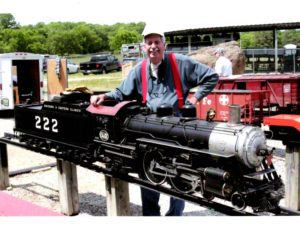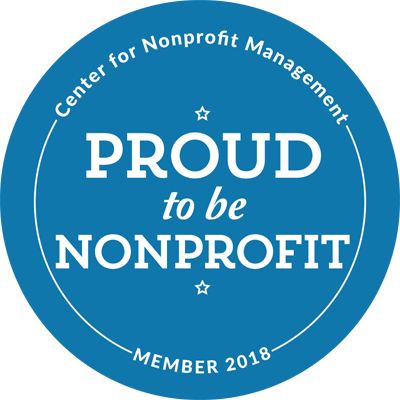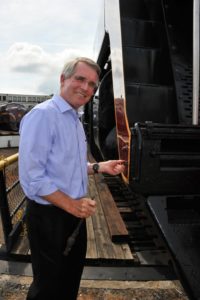 Charles “Wick” Moorman, Co-Chair
Charles “Wick” Moorman, Co-Chair
Wick was born in New Orleans, LA and earned a degree in Civil Engineering from Georgia Tech in 1975. He then hired on with the Southern Railway, before it became Norfolk Southern, and has spent his entire professional career in the railroad industry. Wick served as President and CEO for both Norfolk Southern Corporation and Amtrak.
While at Norfolk Southern, Wick began his career as a track supervisor and division engineer before earning an MBA from Harvard in 1989. Once he returned to Norfolk Southern, he was promoted to Director of Transportation Planning. Wick climbed through several senior management positions and was named President of the company in 2004 and CEO in 2005. As CEO, Wick appreciated railroad history, invested in improvements to infrastructure and created a culture of safety which earned him Railway Age’s 2011 Railroader of the Year. He retired from Norfolk Southern in 2015 to take the reins at Amtrak where he brought this same corporate strategy. Wick retired from Amtrak in 2017.
Wick appreciates the history and preservation of American railroading. While at Norfolk Southern, Wick created the “21st Century Steam Program” to provide special steam-powered excursions for employees, their families, and the public at select cities throughout the Norfolk Southern rail system. He currently serves on the Chevron Audit Committee and the board of directors of Duke Energy Corp. and the Oracle Corp. He also maintains memberships with the Georgia Tech Foundation, National Academy of Engineering, and serves as Chair for the Nature Conservancy for Virginia.
 Rich Tower, Co-Chair
Rich Tower, Co-Chair
Rich was born in Santa Barbara, CA and earned a degree in History and Economic Geography at the University of California in Berkeley. He married Caroline McGilvray of San Francisco in 1983.
He is currently President of the Candelaria Fund, a private family foundation supporting community organizing, cultural and historical organizations and economic opportunity projects. Most of his previous career was in the railroad industry. In 1972 he joined Amtrak as Planner, where he worked closely with state and local agencies to develop plans for new and expanded rail passenger service. In 1974 he joined the Michigan Department of State Highways and Transportation where he was responsible for the planning and implementation of the state rail passenger program. In 1975 he returned to Amtrak as Superintendent of the Detroit District and later the Great Lakes District where he was responsible for passenger train operations in a six-state area.
In 1978 he returned to San Francisco and joined Southern Pacific Transportation Company on the freight side as Supervisor – Car Service. In 1980 he joined Smith Barney Harris Upham as a retail account executive, but returned to the transportation business in 1990 as Chief of Rail Studies for Wilbur Smith Associates, an international planning and engineering firm. Here he was project manager for numerous feasibility and cost studies related to proposed or existing railroad freight and passenger services. Clients included federal, state and local agencies and private railroad companies. During this time, Rich also served on the board of Britrail Travel International, the North American marketing division of British Rail. After retirement from full time work, he joined the Cumbres and Toltec Scenic Railroad from 2006 to 2010 as Vice President and Treasurer, assisting in the formation and management of the company awarded the contract to operate the narrow gauge steam tourist line in Colorado and New Mexico.
Rich maintains memberships and volunteers at numerous railroad historical societies and museums. He currently serves as Chair of the Investment Policy Committee for Bay Area Electric Railroad Association and Western Railway Museum, Rio Vista Junction, California and is Chair, Endowment Committee and member of the board of directors for the Center for Railroad Photography and Art, Madison, Wisconsin.
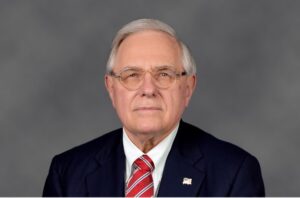 Ron Batory
Ron Batory
Batory began his 46-year railroad career in 1971 working for the Detroit, Toledo & Ironton Railroad, and then served in positions of progressively greater responsibility with the Grand Trunk Western Railroad, the Chicago, Missouri & Western Railway, and Southern Pacific Transportation Company. In 1994, he became President of the Belt Railway of Chicago, the largest intermediate switching terminal in the U.S. In 2004, Batory became President & Chief Operating Officer of Conrail, the eighth largest freight railroad in America, until his retirement in April 2017. Mr. Batory went on to serve as Federal Railroad Administrator and, while holding this position, in 2020 was voted one of the “Top 10 Most Influential Leaders” in the North American railway industry.
In February 2021, Batory was appointed to the board of the R. J. Corman Railroad Company, operator of the Nashville and Eastern and numerous other short line railroads and railroad service companies.
.
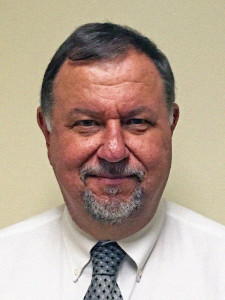 Terry Bebout
Terry Bebout
Terry began his Railroad career in 1989 operating excursion trains on the Nashville and Eastern Railroad. He also worked for the Broadway Dinner Train from 1989-1999 as Brakeman and Conductor. Terry is currently president of the Tennessee Central Railway Museum (TCRM), a position he has held since 1991. At the TCRM, he manages operations and the volunteer work force, ensuring excursion trains operate safely and successfully.
His full time profession is serving as the General Manager of the Music City Star commuter train that operates between Lebanon (Tennessee) and Nashville. In addition to his managerial duties, Terry is a qualified Conductor, Engineer, Dispatcher and Supervisor of Locomotive Engineers on the Nashville and Eastern Railroad. Terry is a founding member of Nashville Steam and previously served as Vice President.
 William Drunsic
William Drunsic
A true railroad man, William has over 40 years of direct Class I and Class III experience. After graduating from Rensselear Polytechnic Institute with a degree in Civil Engineering, he made his first foray into the business as a field supervisor for the New York Central Railway. In the seventies, he moved to Vermont where he started a railroad construction and rehabilitation business serving the Northeast region. Supplementing his income with side consulting projects, he and a former NYCRR partner were solicited in the early eighties to assess the viability of reopening a Tennessee branch line of the CSX railroad. Upon presentation of their analysis to the local rail authority, the partners were offered the opportunity to become operators of the 130-mile former Tennessee Central line on the verge of abandonment that originated in Nashville and terminated in Monterey. Inheriting a poorly maintained right-of-way and a dwindling customer base, William and his partner successfully gambled that the line, now the Nashville and Eastern Railroad, could be made profitable once again.
In 2005, William also formed Transit Solutions Group which became the designated operator of the Nashville Music City Star commuter service. Since its initial start-up in 1986, the NERR has worked collaboratively with the Tennessee Department of Transportation (TDOT) and the Nashville and Eastern Railroad Authority (NERA) to invest over $80 million into essential rail infrastructure improvements. In late 2018, R. J. Corman Railroad Company finalized an agreement to acquire the Nashville & Eastern Railroad as well as the Nashville & Western Railroad Corp., Transit Solutions Group and three related operating entities.
Bill and his wife, Linda, are residents of Manchester, Vermont, and are the proud parents of two daughters, Amy and Aranda, and two sons, Michael, and Stephen.
.
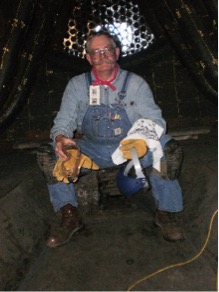 Michael F. Hartshorne, M.D.
Michael F. Hartshorne, M.D.
Born and raised in the “Atomic City” of Los Alamos, New Mexico, Mike Hartshorne spent 7 years in a Catholic seminary in Santa Fe where he received a B.A. in Social Work. Mike then changed his mind about that particular calling and abruptly found himself in the Army in 1969, becoming a psychiatric medic working at Ft. Ord, California and Vietnam. Discharged in 1972 he received a B.S. in Biology and Chemistry at the University of New Mexico and started Medical School in 1975 at UNM. He did his post-graduate training at Brooke Army Medical Center starting in 1978 with a residency in Radiology and a fellowship in Nuclear Medicine. In 1988, he became Chief of Imaging at the Albuquerque VA Medical Center.
As a UNM Professor he worked for three decades to train Radiology residents and has collaborated on NIH field studies of radiation induced thyroid cancer in Estonia and Kazakhstan. Mike’s academic accomplishments include development of software based image fusion algorithms with Picker International, FDG imaging for infection and F-18 high-resolution bone scan imaging. Mike was an American Board of Radiology Oral Board Examiner for 29 years. He is now retired from the Army, the VA, and UNM.
Mike currently serves Professor Emeritus at UNM and “pinch hitter” in the Imaging Service at the Albuquerque VA Hospital. Mike proudly serves as President of the New Mexico Steam Locomotive and Railroad Historical Society. Additionally, he has finished two terms as a Trustee for the National Atomic Museum Foundation.
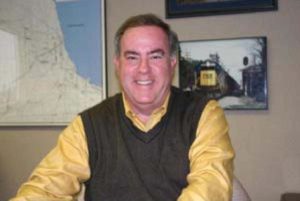 Mark Hinsdale
Mark Hinsdale
Mark is a native of Detroit, Michigan. He attended Michigan State University in East Lansing and earned a degree in Transportation Administration from the College of Business in 1974. During college he was a Rail Operations Analyst with the Michigan Department of State Highways and Transportation, assisting in the implementation of Amtrak’s passenger services.
After graduation, Mark accepted employment with the Grand Trunk Western Railroad as Assistant Terminal Trainmaster and later Trainmaster at various locations. However, the bulk of his railroad career was at CSX. Starting as Supervisor Transportation in Southfield, Michigan, he was steadily promoted to positions of increasing responsibility across the CSX system including Regional Superintendent in Nashville, Senior Director Strategic Planning in Jacksonville, Superintendent of the Cumberland Coal Business Unit in Maryland and General Manager of the Detroit and Chicago Service Lanes.
In 2001 he took leave from CSX to serve as General Manager Operations for Freight Australia Pty. Ltd. in Melbourne, a Rail America subsidiary. Returning to CSX in 2004, he served successively as Assistant Vice President Integrated Planning, Assistant Vice President Network & Interline Strategy and Assistant Vice President Network Strategy, all at CSX headquarters in Jacksonville, FL.
Mark retired in 2011 and lives in Chicago, IL. He is an accomplished photographer of railroad subjects across the United States. He is a member of the American Association of Railroad Superintendents, the Detroit Economic Club and the Chicago Rail Carriers Association. He has served as a board member for the Belt Railway Company of Chicago and the Indiana Harbor Belt Railroad.
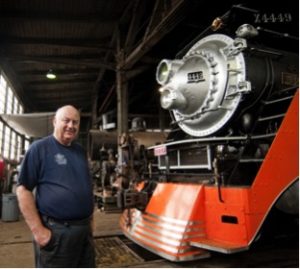 Doyle McCormack
Doyle McCormack
Doyle was born and raised in Conneaut, OH. After graduating high school, he enlisted in the U.S. and served as a communications electrician on the USS Saratoga and on the USS Theodore Roosevelt.
After discharge from the Navy, Doyle went to work for the N&W (Nickel Plate) as a telegraph operator before entering engine service as a fireman and later promoted to Locomotive Engineer. Doyle got involved with the High Iron Company when it brought the NKP 759, steam locomotive, to Conneaut to be rebuilt for excursion service. He was part of the engine crew for the Golden Spike Centennial Limited and other excursions for the next few years. In 1974, Doyle got a call about being on the team to rebuild the Daylight steam locomotive 4449 for the American Freedon Train.
During the American Freedom Train, Doyle took a leave of absence from the N&W and went to Portland, Oregon where he was chosen to be the Chief Mechanical Officer for the rebuild of 4449 as well as its engineer. After the American Freedom Train concluded, he took a job in engine service for the Southern Pacific Railroad in Portland until his retirement in 2003.
In February 1981 the 4449 was called to represent the SP at the California State Railroad Museum in Sacramento, California. This lead to a second career for him and the 4449 which has lasted to this day. This also opened doors that allowed him to be involved in several steam locomotive restorations and operations. In 1990 he was honored to be asked to join the newly created Engineering Standards Committee for Steam Locomotives. This committee has worked hard over the years to promote the safe maintenance and operation of steam locomotives, as well as being part of the re-writing of the federal regulations regulating steam locomotives and helped write a section in the National Boiler Inspection Code that covers steam locomotives.
Doyle has been President of the Oregon Rail Heritage Foundation since the late nineties and has presided over the building of the Oregon Rail Heritage Center that is now the home for the SP 4449, SP&S 700 and the OR&N 197, all steam locomotives that belong to the City of Portland.
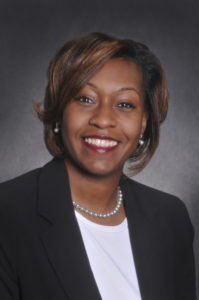 Monique Odom
Monique Odom
Monique Odom is a native Nashvillian who has been with Metro Government since 2002, most of which have been with the Parks and Recreation Department. Since joining Parks in 2006 Monique’s responsibilities have primarily been focused on the department’s fiscal matters.
Monique was named Parks Director in October 2017. As Parks Director Monique heads one of the largest Parks Department in Tennessee – overseeing almost 16,000 acres of parks property, which includes 185 parks, 85 miles of greenway, 7 municipal golf courses, 7 regional community centers, 19 neighborhood centers, 7 dog parks, 171 sports fields, 4 nature centers, and seven historical sites.
Prior to her employment at Parks she served as the program coordinator for the Metro Human Relations Commission where she supervised all fiscal and administrative functions and oversaw the Commission’s programming efforts.
Monique holds a B.A. from Fisk University and a Master of Public Administration (MPA) from Tennessee State University’s College of Public Service and Urban Affairs (formerly known as the Institute of Government).
Monique is a certified Diversity Trainer, has been trained in Rule 31 Civil Mediation, and has experience in public utility regulation, non-profit program management, and corporate human resources. She is a Certified Municipal Finance Officer (CMFO) by the Tennessee Comptroller of the Treasury, and has successfully completed the National Recreation and Park Association’s two-year Directors School. Monique has recently been selected for the 2018-2019 class of Leadership Nashville.
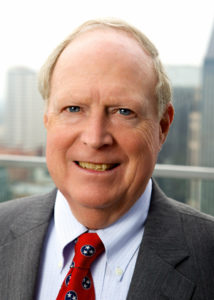 Bill Ozier
Bill Ozier
Bill Ozier is a Nashville native. He graduated from Vanderbilt University in 1966 and from Vanderbilt Law School in 1969 where he was in the first class of Patrick Wilson merit scholars. He went to work for the Nashville law firm of Bass, Berry & Sims where he spent his entire career— most of it as a labor & employment lawyer representing management. Over his career he represented employers all over the state of Tennessee including both Fortune 500 companies and locally owned businesses. One of his major clients over his career was Vanderbilt University. He represented the University in a wide variety of mostly employment related matters including a number of cases brought by faculty members contending that they had been denied tenure because of their race or gender.
Bill has served several terms on the Executive Committee of Bass, Berry & Sims and 6 years as managing partner. Bill was selected in the first edition of Best Lawyers in America and continued to be among that list for over 35 years . He was also listed in many other “best” lists and was named “Management Employment Lawyer of the Year” for Nashville by Best Lawyers in 2012. He was inducted into the College of Labor and Employment Lawyers in 2002. Bill served on the Board of Directors of both the Tennessee Chamber of Commerce and Industry and Tennessee Business Roundtable. He was General Counsel of the Board for the Tennessee Chamber from 2008-2011 and Chairman of the Board from 2012-2014. He retired from the practice of law at the end of 2017 and joined the NSPS as a volunteer.
Bill has assisted in numerous NSPS work sessions and has assisted the organization in fund raising activities. Bill has had a long time fascination with railroads and after having model railroads as a child , he returned to the hobby in the early 70’s. After giving up the hobby as his children began to take more of his non-work time, he recently returned to “modeling” along with his efforts on behalf of restoring No. 576.
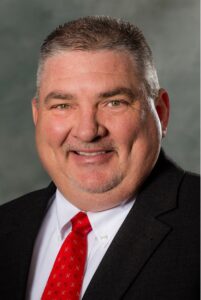 Mike Philpot
Mike Philpot
Michael Philpot joined R. J. Corman in 2011 after a 15 year career with CSX Transportation. He has previously served as Assistant General Manager of the Railroad Company, General Manager of Material Sales and Vice President of Switching, responsible for managing the company’s switching operations in 15 division locations in nine states.
R. J. Corman Railroad Group is headquartered in Nicholasville, Kentucky, and has field locations in 23 states. The company serves all seven Class I railroads, many regional and short line railroads as well as various rail-served industries. These operations encompass an array of services, including: railroad construction, short line railroad operations, dispatch, industrial switching services, emergency response, track material logistics, distribution centers, signal design and construction and an excursion dinner train.
R. J. Corman has operated the Nashville and Eastern Railroad since January 2019. N&E serves 39 customers on 145 miles of track and is home to the WeGo Star commuter train service between Nashville and Lebanon.
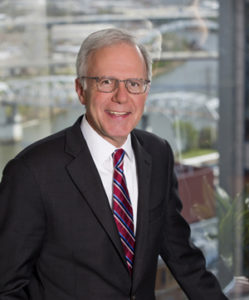 Bill Purcell
Bill Purcell
Mayor of Nashville from 1999 – 2007. After leaving office, Bill Purcell served as the Founding Dean of the College of Public Service and Urban Affairs at Tennessee State University and then became the Director of the Institute of Politics at the Harvard Kennedy School and served as a Lecturer there. Since returning to Nashville, he teaches the undergraduate courses Cities in the 21st Century and Public Advocacy at Vanderbilt University where he is an Adjunct Professor of Public Policy. From 1986 to 1996 was a member of the Tennessee House of Representatives, serving as Majority Leader from 1990 until 1996. He is counsel to the law firm Frost Brown Todd, LLC and chairs the Board of the Metropolitan Development and Housing Agency in Nashville.
Henry “Hank” Sherwood
Hank Sherwood joins the NSPS Advisory Committee with a carrer in marketing. Originally from Crown Point, Indiana, Hank attended and graduated from the Art Institute of Chicago, St. Joseph College, and the Ringling School of Art. He began his carrer in Chicago working for advertising agencies such as Fulton-Morrissey, Goodyear Truck Tires, U.S. Gypsum Co, Overhead Door Co, and the Illinois Central Gulf Railroad to name a few.
Hank moved to Nashville in 1969 and continued his marketing career serving many noteable clients before co-founding Gish, Sherwood & Friends where he served as Executive Vice President. Starting with only 3 people, upon his retirement, the firm had grow to over 60 employees. His company continues to thrive and is known today as simply GS&F.
Hank has always been a train buff, having a grandfather, T.C. Sherwood, who was an engineer and would take young Hank to the roundhouse and put him in the engineer’s seat of a steam locomotive. Hank is also a member of the Tennessee Central Railroad Museum and the Mid-South Live Steamers. He has built two operatting 1/8th scale steam locomotives and says in building the two engines, he really learned how a steam locomotive worked.

